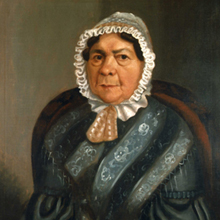
Back Ніпмук Byelorussian Нипмуки Bulgarian Nipmuc Catalan Nipmuck German Nipmuck Spanish Nipmucs French Nipmuc Croatian ニプマク Japanese Nipmuki Latvian/Lettish Нипмуки Russian
 Portrait of Hepsibeth Hemenway, a Nipmuc woman from Worcester, Massachusetts, 1830 | |
| Total population | |
|---|---|
| Contemporary people claiming Nipmuc descent: 354 Chaubunagungamaug, (2002)[1] 526 Hassanamisco Nipmuc (2004).[2] Possible total 1,400 (2008)[3] | |
| Regions with significant populations | |
| Central Massachusetts ( | |
| Languages | |
| English, possibly formerly Nipmuc and Massachusett | |
| Religion | |
| Traditionally Animism (Manito), Christianity. | |
| Related ethnic groups | |
| Narragansett, Shawomet, Eastern Niantic peoples[4] [5] |
The Nipmuc or Nipmuck people are an Indigenous people of the Northeastern Woodlands, who historically spoke an Eastern Algonquian language. Their historic territory Nippenet, "the freshwater pond place," is in central Massachusetts and nearby parts of Connecticut and Rhode Island.
The Nipmuc had contact with traders and fishermen from Europe prior to the colonization of the Americas.[6] The first recorded contact with Europeans was in 1630, when John Acquittamaug (Nipmuc) took maize to sell to the starving colonists of Boston, Massachusetts.[7] The colonists carried diseases, such as smallpox, to which the Native Americans had no immunity, and tribes in New England suffered high mortality rates to these infectious diseases. After the colonists encroached on their land, negotiated fraudulent land sales and introduced legislation designed to encourage further European settlement, many Nipmuc joined Metacomet's war against colonial expansion, known as King Philip's War, in 1675, though they were unable to defeat the colonists. Many of the Nipmuc were interned on Deer Island in Boston Harbor and died of disease and malnutrition, while others were executed or sold into slavery in the West Indies.
Christian missionary John Eliot arrived in Boston in 1631. After learning the Massachusett language, which was widely understood throughout New England, he converted numerous Native Americans to Christianity and published a Bible translated in Massachusett and a Massachusett grammar. Backed by the colonial government, he established several "Indian plantations" or praying towns, where Native Americans were coerced to settle and be instructed in European customs and converted to Christianity.
The state of Massachusetts recognizes the Hassanamisco Nipmuc[8] while the federal government does not.[9]
- ^ Martin, A. M. U.S. Department of the Interior, Bureau of Indian Affairs. (2004). Final determination against federal acknowledgment of the Nipmuc Nation (fr25jn04-110). Retrieved from Federal Register Online via GPO Access website: http://edocket.access.gpo.gov/2004/04-14394.htm.
- ^ The Assistant Secretary for Indian Affairs. (2004). Martin issues final determination to decline federal acknowledgment of the nipmuc nation. Retrieved from website: http://www.doi.gov/archive/news/04_News_Releases/nipmuc.html Archived 2012-09-21 at the Wayback Machine
- ^ Cite error: The named reference
autogenerated1was invoked but never defined (see the help page). - ^ Pritzker, Barry (2000). A Native American Encyclopedia: History, Culture, and Peoples. Oxford: Oxford University Press. p. 442. ISBN 978-0-1951-38771. Retrieved 16 September 2021.
- ^ Pritzker, B. M. (2000) A Native American Encyclopedia: History, Culture, and Peoples (p. 442). Oxford, UK: Oxford University Press.
- ^ Marr, John S.; Cathey, John T. (2010). "New Hypothesis for Cause of Epidemic among Native Americans, New England, 1616–1619". Emerging Infectious Diseases. 16 (2): 281–286. doi:10.3201/eid1602.090276. PMC 2957993. PMID 20113559.
- ^ Larnad, E. D. (1874). History of Windham County, Connecticut: 1600-1760. (Vol. I, p. 59). Cambridge, MA: Harvard University Press.
- ^ "State-Recognized Tribes: Massachusetts". Federal and State Recognized Tribes. National Conference of State Legislatures. Retrieved 16 September 2021.
- ^ "Final Determination Against Federal Acknowledgment of the Nipmuc Nation". Federal Register. Indian Affairs Bureau. 25 June 2004. Retrieved 16 September 2021.
© MMXXIII Rich X Search. We shall prevail. All rights reserved. Rich X Search